W ostatnim okresie, a szczególnie , po ogłoszeniu prezydenta USA Donalda Trumpa o uznaniu Jerozolimy jako stolicy Izraela, wśród członków osi oporu, w tym Hamasu, Palestyńskiego Islamskiego Dżihadu (PIJ), Ludowego Frontu Wyzwolenia Palestyny (LFWP), Iranu i Hezbollahu, prowadzono intensywne dyskusje w sprawie walki przeciwko Izraelowi. W tych rozmowach przedstawiciele Iranu, Hezbollahu i frakcji palestyńskich podkreślali potrzebę wspólnego działania, by rozszerzyć intifadę i zmobilizować siły „w obronie Jerozolimy”. Według doniesienia w libańskiej gazecie, obecnie ci ludzie tworzą centrum dowodzenia, by koordynować wspólne reakcje przeciwko Izraelowi i oświadczeniu Trumpa.
Przedstawiciele Iranu z prezydentem Hassanem Rohanim i Kassemem Soleimanim, dowódcą Siły Kuds Korpusu Strażników Rewolucji Islamskie na czele wyjaśnili Hamasowi i innym palestyńskim frakcjom, że Iran jest po ich stronie i umieści do ich dyspozycji wszystkie zasoby, jakie ma, i że wszystkie siły oporu w regionie są gotowe bronić meczetu Al-Aksa. Dodatkowo, dwóch dowódców szyickich milicji – Kais Al-Chaz’ali, dowódca irackiej milicji 'Asaib Aal Al-Hakk, która jest częścią związanych z Iranem Ludowych Jednostek Mobilizacyjnych, oraz Hamza Abu Al-’Abbas, dowódca milicji Liwa Al-Imam Al-Baqr – przedsięwzięli prowokacyjny krok odwiedzenia libańsko-izraelskiej granicy i wyrażali groźby przeciwko Izraelowi[1]. Sekretarz generalny Hezbollahu, Hassan Nasrallah, podkreślił, że oś oporu, która osiągnęła wiele zwycięstw przeciwko wrogom w Syrii i Iraku, jest teraz gotowa dołączyć do walki przeciwko Izraelowi.
Wypowiedzi o potrzebie połączenia sił przeciwko Izraelowi pojawiły się także w artykułach w proreżimowej prasie syryjskiej, a niektóre z nich stwierdzały, że konfrontacja z Izraelem stała się nieunikniona.
Jak wspomniano, ściślejsza kooperacja między tymi organizacjami była widoczna od kilku miesięcy i podobno jest związana ze staraniami Iranu do zjednoczenia osi oporu i zlikwidowania różnic między jej różnymi składnikami po długim okresie napięć między Hamasem a Iranem i rozziewu między Hamasem i reżimem Assada. Ten ton słychać od momentu oznajmienia Trumpa o Jerozolimie. W przemówieniu z 11 grudnia 2017 r. sekretarz generalny Hezbollahu, Hassan Nasrallah, wezwał wszystkie siły oporu w regionie do zjednoczenia się po trudnych latach, jakich doświadczyli, i do sformułowania wspólnej strategii i jednolitego planu działania dla region w celu odzyskania Jerozolimy[2]. Nawaf Al-Moussawi, libański parlamentarzysta z ramienia Hezbollahu, powiedział, że ruch zaczął “podejmować środki w celu zjednoczenia [osi] oporu na wszystkich frontach i na wszystkich arenach”[3]. W przemówieniu z 14 grudnia, szef biura politycznego Hamasu, Isma’il Hanija, wezwał „wszystkie siły i części składowe ummah do ustanowienia wspólnych centrów [dowodzenia] dla strategicznego myślenia”[4].
Niniejsze opracowanie jest przeglądem intensywnych kontaktów między siłami osi oporu w ciągu ostatnich kilku tygodni, zarówno przed, jak po oświadczeniu Trumpa; starań Iranu o ponowne zjednoczenie osi i wezwań, by oś nasiliła walkę przeciwko Izraelowi, a nawet rozpoczęła konfrontację z nim.
[Samo opracowanie nie jest spolszczone]
Qassem Soleimani To Hamas, PIJ Commanders: The Resistance Forces In The Region Are Ready To Defend Al-Aqsa
According to December 11 reports in the Iranian media and the media identified with the resistance axis, IRGC Qods Force commander Qassem Soleimani spoke on the phone with the commanders of Hamas’s and the PIJ’s military wings, and clarified that Iran would be willing to support the Palestinian resistance forces and that all the resistance forces in the region were ready to defend Al-Aqsa.[5]
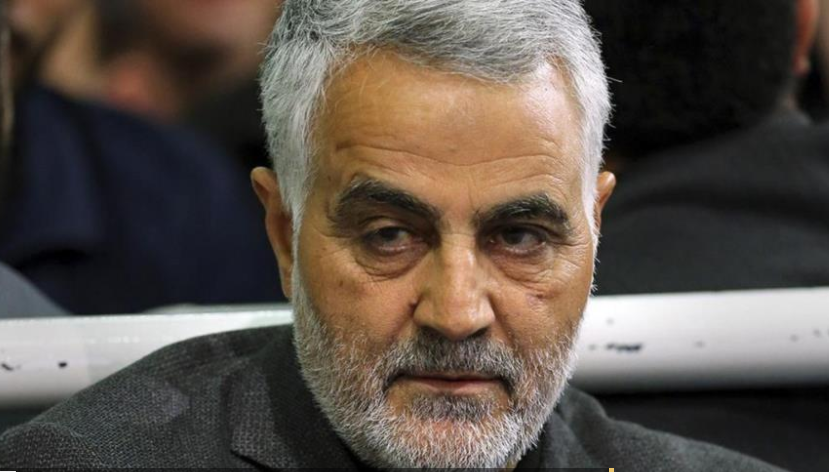 Qassem Soleimani (image: Aljazeera.net)
Qassem Soleimani (image: Aljazeera.net)
On December 13, the Kuwaiti daily Al-Jarida, known for its anti-Iran positions, reported that in this phone call Soleimani asked the Hamas and PIJ military chiefs to start recruiting operatives in the West Bank, and promised them weapons for armed action against Israel from the West Bank. He added that Iran’s Supreme Leader Ali Khamenei had clarified that arming the West Bank was a top priority for Iran and that Trump’s Jerusalem announcement must be leveraged to ignite the struggle against Israel.[6]
Hamas Leader, PIJ Spokesman: Soleimani Placed Iran’s Capabilities At Our Disposal
Yahya Al-Sinwar, Hamas’s leader in Gaza, confirmed in a December 25 speech that Soleimani had „contacted [Hamas’s military wing], the '[Izz Al-Din] Al-Qassam Brigades, and [the PIJ’s military wing], the Al-Quds Brigades, to stress that Iran and the IRGC, with all their capabilities, would stand alongside the Palestinian resistance.” Soleimani, he added, had offered to extend every assistance in defending Jerusalem, „while presenting no conditions to the Palestinian resistance for receiving [Iran’s] full support.” PIJ Spokesman Daoud Shihab likewise told the Al-Mayadin television channel that Iran had placed all its capabilities at the disposal of the Palestinian resistance, without any conditions.[7]
Iranian President Rohani To Hamas Leader Haniya: Iran, With All Its Capabilities, Will Stand Alongside The Palestinian People
On December 11, 2017, the day Soleimani reportedly spoke with the PIJ and Hamas commanders, it was also reported that Hamas political bureau head Isma’il Haniya had spoken on the phone with Iranian President Hassan Rohani and discussed the implications of Trump’s decision on Jerusalem, which he called an act of „aggression against the Palestinian people and the Islamic ummah.” Haniya thanked Iran for its support of the Palestinian people and its resistance. Rohani, for his part, called Trump’s decision „the pinnacle of aggression by the countries of global arrogance,” and emphasized that „Iran, with all its capabilities, will stand with the Palestinian people so that it [attains] its whole state, with Jerusalem as its capital.”[8]
Commanders Of Shi’ite Iraqi Militias Touring Lebanon-Israel Border: We Will Help Hizbullah In Confrontation With Israel
On December 9, Qais Al-Khaz’ali, commander of the Iraqi 'Asaib Aal Al-Haqq militia, which is part of the Iran-affiliated Popular Mobilization Units (PMU), toured the village of Kafr Kila in South Lebanon, near the Israeli border. Footage of his visit was shown on the Al-Ahd channel, which Al-Khaz’ali owns. Al-Khaz’ali, dressed in uniform, declared on this occasion that his militia „is on full alert, [ready] to help the jihad fighters of the resistance [i.e., Hizbullah]… and to stand in the same trench with the Lebanese people and with the Palestinian cause, opposing the oppressive Israeli occupation that is hostile to Islam, to the Arabs and to humanity.”[9]
For a Memri TV clip of Al-Khaz’ali’s visit to the border, click below:
On December 26, 2017, the Shi’ite Liwa Al-Imam Al-Baqr militia, which is fighting in Syria alongside the Assad regime, also published photos of its commander, Hamza Abu Al-’Abbas, touring the Lebanon-Israel border and scoping out the Israeli side. The photos were captioned, „Israel should know that we are on its borders, and one day we will breach them.”[10]
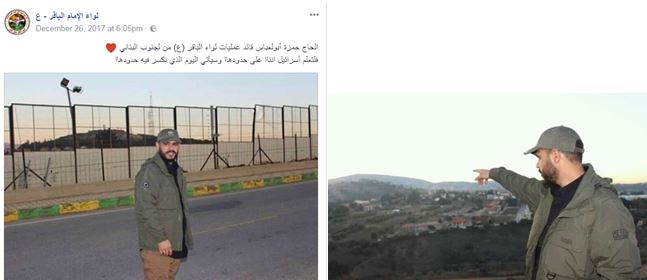 Hamza Abu Al-’Abbas on the Lebanon-Israeli border (Facebook.com/baqeru, December 26, 2017, Twitter.com/larasaker, December 27, 2017)
Hamza Abu Al-’Abbas on the Lebanon-Israeli border (Facebook.com/baqeru, December 26, 2017, Twitter.com/larasaker, December 27, 2017)
Meetings, Contacts Between Hizbullah, Hamas, PIJ And PFLP Leaders
On December 7, 2017, a Hamas delegation headed by the movement’s political chief in Lebanon, Al-Hajj Ahmad 'Abd Al-Hadi, met in Beirut with Hizbullah political bureau member Hassan Huballah. In the meeting the two condemned Trump’s Jerusalem declaration, claiming that it exposed „the U.S. support for terrorism which is aimed at tearing apart the Arab and Islamic nation.” They stressed that Jerusalem was the eternal capital of Palestine, and underscored their commitment to „the option of resistance, which is the only way to liberate the land, the prisoners and the holy places.” They called to „support the Al-Quds intifada and supply the Palestinian people with everything they need to stand fast against the Zionist enemy.”[11]
On December 8, a Hamas delegation headed by political bureau member Moussa Abu Marzouq met in Beirut with PIJ secretary-general Ramadan 'Abdallah Shalah, to discuss Trump’s „oppressive decision” and the ways to oppose it. They called to „activate the Al-Quds intifada against the Zionist occupation, as a natural reaction to Trump’s decision,” emphasizing that „intifada and resistance are the only way to liberate our land and our holy places.”[12]
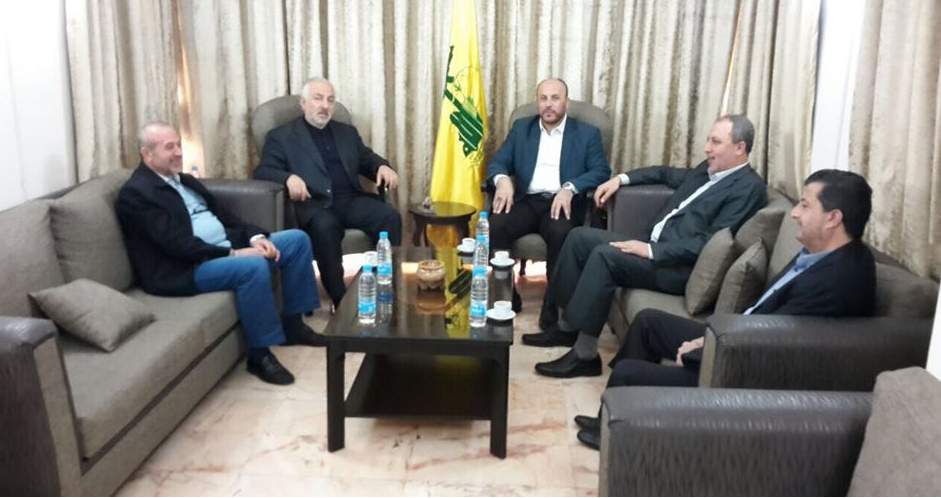 Meeting in Beirut of Hamas delegation with member of Hizbullah’s political bureau (Source: palinfo.com, December 7, 2017).
Meeting in Beirut of Hamas delegation with member of Hizbullah’s political bureau (Source: palinfo.com, December 7, 2017).
Nasrallah To PFLP Delegation: Resistance Axis Should Turn To Struggle Against Occupation
On December 20, 2017, a PFLP delegation headed by the movement’s deputy secretary-general, Abu Ahmad Fuad, met with Hizbullah secretary-general Hassan Nasrallah to discuss the situation in the region and Trump’s decision about Jerusalem. During the meeting, Nasrallah emphasized that „the resistance axis has attained great achievements against terrorism and now has plenty of time to turn to the Arab struggle with the [Israeli] occupation and mobilize all its forces and energy toward a future confrontation with the enemy.” He also expressed hope that the Palestinian intifada would continue. The PFLP representatives expressed their „readiness to participate in any type of action against the occupation and in the consolidation of a joint plan for resistance to the occupation.”[13]
Two days after the meeting, the PFLP’s armed wing issued a statement saying that it considered all headquarters of the American enemy across historic Palestine legitimate targets for attack. The spokesman for the military wing underscored that the movement would also employ armed resistance against the Zionist occupation and that „all options are open and there are no red lines following the crime committed by the terrorist Trump against Jerusalem…” The spokesman emphasized the close relations between the PFLP and Hizbullah and added that the movement saw itself as part of the resistance axis and as an ally of Iran.[14]
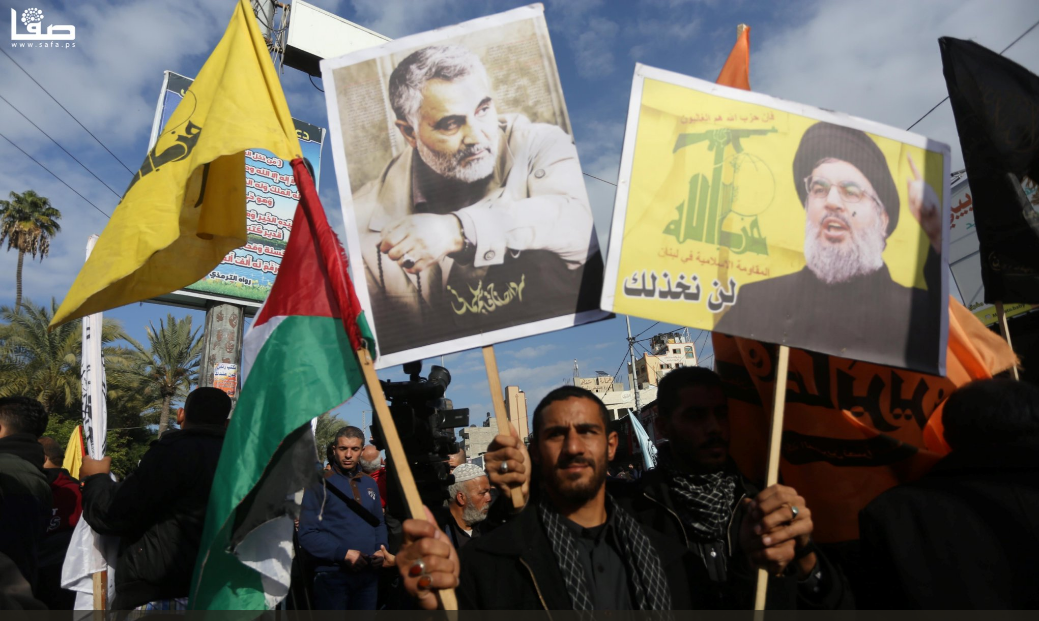 Protesters hold up pictures of Qassem Soleimani (left) and Hassan Nasrallah at a Gaza demonstration against Trump’s Jerusalem announcement (Source: twitter.com/SafaPs, December 15, 2017).
Protesters hold up pictures of Qassem Soleimani (left) and Hassan Nasrallah at a Gaza demonstration against Trump’s Jerusalem announcement (Source: twitter.com/SafaPs, December 15, 2017).
Article In Lebanese Daily: Hizbullah, PMU And Palestinian Organizations, Including Hamas, Are Forming Joint War Room
In a December 27, 2017 article, The Daily Star, a Lebanese English-language paper, reported that Hizbullah, Iraqi PMU militias, Hamas, and five other Palestinian armed organizations in Gaza and the West Bank (that were not named) are currently acting to form a joint war room to coordinate their military action in response to Trump’s Jerusalem announcement. A security source cited by the paper said that the resistance axis may soon issue an official statement that it is uniting to confront Israel and Trump’s decision.[15]
Several days before this, Nawaf Al-Moussawi, a Lebanese MP on behalf of Hizbullah, said that the movement had begun to „take measures on the ground towards uniting the resistance [axis] on all fronts and in all arenas.”[16]
Numerous contacts between the leaders of Hizbullah, Hamas, and PIJ also took place in the weeks preceding Trump’s announcement on Jerusalem. On October 31, 2017, Hizbullah secretary-general Hassan Nasrallah met with the deputy head of Hamas’s political bureau, Saleh al-’Arouri, to discuss „ways to strengthen the resistance and unite the efforts to oppose the Israeli occupation.” The two stressed that „it is important that the resistance movements meet, unite, and join forces against the Zionist attacks.” On the same day, Nasrallah phoned the PIJ secretary-general Ramadan 'Abdallah Shalah to condemn Israel’s bombing of one of the movement’s tunnels and offer condolences for the death of the movement’s fighters. He stressed that Hizbullah supports the Palestinian resistance in their joint campaign.[17]
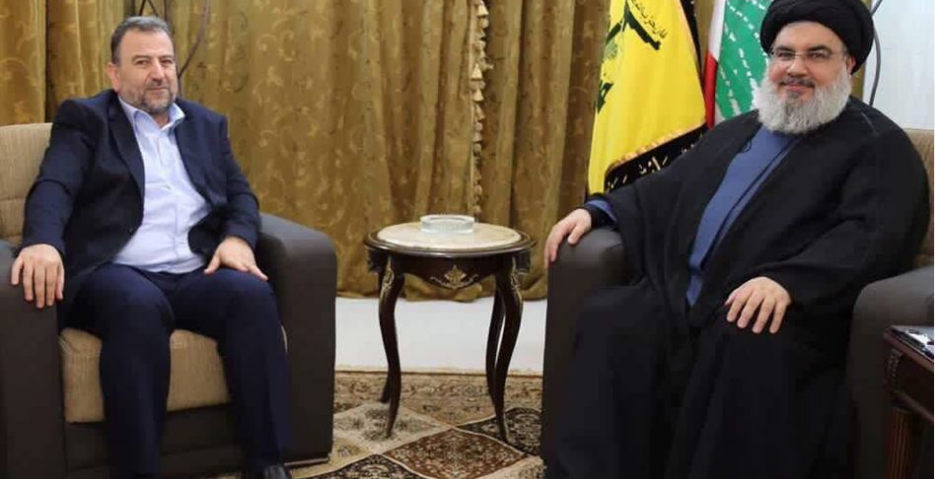 Nasrallah (right) with Al-’Arouri in Beirut (Source: palinfo.com, November 1, 2017)
Nasrallah (right) with Al-’Arouri in Beirut (Source: palinfo.com, November 1, 2017)
On the following day, November 1, 2017, a Hamas delegation led by Saleh Al-’Arouri met with Ramadan Shalah and his deputy, Ziad Al-Nakhla. A Hamas source reported that they discussed the escalation of Israeli measures and „stressed the unity of the people and its resistance movements against the Israeli crimes and aggression, and the necessity to work together to defeat the occupation.”[18]
Hamas, Iran Renew Relations; Hamas Official: We Have Military Cooperation With Hizbullah, Iran
In this context it should be mentioned that, in recent months, there has been a significant improvement in the relations between Hamas and Iran, which had been strained for several years. The warming of relations took place following the election of a new leadership of the Hamas movement in Gaza, headed by Yahya Al-Sinwar. During October 2017, senior Hamas officials made statements in favor of renewing relations with Iran. Al-Sinwar himself said, „Anyone who thinks that we will cut off our relations with any country suffers from delusions, for Iran is the greatest supporter of [the Hamas military wing, the ’Izz Al-Din] Al-Qassam Brigades.” In addition, a delegation of senior Hamas officials headed by Saleh Al-’Arouri visited Tehran, where Hamas Spokesman Sami Abu Zuhri announced that „the differences between Iran and Hamas are a thing of the past and their relations are back on track.”[19]
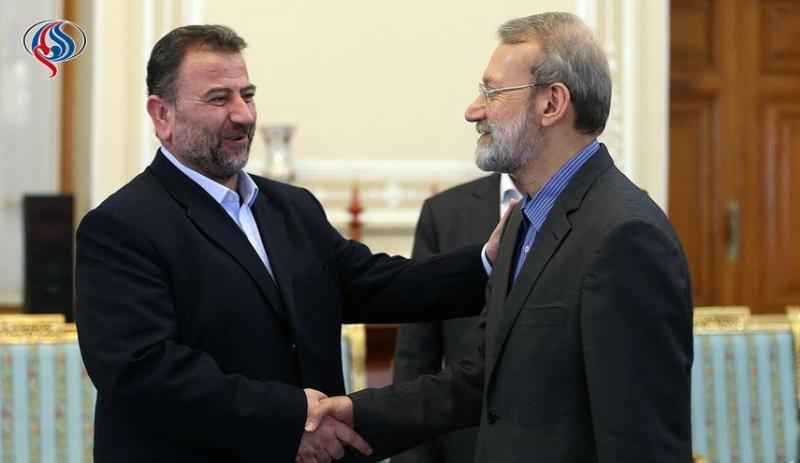 Saleh Al-’Arouri (left) with Ali Larijani in Iran (Source: alalam.ir, October 21, 2017).
Saleh Al-’Arouri (left) with Ali Larijani in Iran (Source: alalam.ir, October 21, 2017).
The improvement in Hamas-Iran relations is also expressed in the tightening of relations between Hamas and Hizbullah, a prominent reflection of which was the aforementioned meeting between Nasrallah and Al-’Arouri in early November. A few weeks later, on November 24, 2017, in an interview with the London daily Al-Sharq Al-Awsat, Hamas political bureau member Salah Al-Bardawil said that, despite Hamas’s past differences of opinion with Iran and Hizbullah on the matter of Syria, today „there is cooperation between Hizbullah, Hamas, the [other] elements of the resistance, and Iran.”[20]
Iran Working To Reunite Resistance axis, Promote Reconciliation Between Hamas, Assad Regime
In recent months, there have also been multiple reports in the Arab press that Iran and Hizbullah are trying to mediate the renewal of relations between Hamas and the Assad regime, which ran aground in 2011 after Hamas took a stand against Assad’s regime and its armed suppression of the Syrian revolution. The Syrian daily Al-Watan, which is close to the Assad regime, reported on September 25 that Iran was interested in „reviving the relations that had previously existed among the members of the resistance axis, which comprises Iran, Syria, Lebanese Hizbullah, and the factions of the Palestinian resistance, including Hamas.”[21] Later it was reported that, as part of efforts to restore the relations between the sides, a senior Hamas official visited Damascus with Hizbullah mediation, and that Yahya Al-Sinwar himself supports the idea of renewing the relations.[22] However, other reports have it that no breakthrough has so far been achieved and that Hamas still refuses to change its attitude towards the Assad regime.[23]
On November 2, 2017, the Lebanese daily Al-Akhbar, which is closely identified with Hizbullah, reported that „the resistance axis has declared, in more ways than one, that it has restored its vitality, now that its members have readjusted their mutual relationships and set their priorities.” The paper added that, „excluding one step – the renewal of Hamas-Syrian relations – it may be said that the camp is back [on track].”[24]
Despite the reports that Hamas is still not prepared to change its stance on the Syrian regime, some prominent positive statements about Syria were made recently by senior members of the movement. For example, Hamas official Mahmoud al-Zahhar told the Iranian news agency Tasnim that „relations between Hamas, Syria and Iran must develop and return to what they were.” [25] In addition, in a speech he delivered at a conference in Beirut on November 1, 2017, Hamas political bureau head Isma’il Haniya expressed hope that „stability will return to Syria and that Syria will resume its historic role with respect to Palestine.[26]
On December 31, 2017, the online daily Raialyoum.com reported, citing a senior Hamas source, that Hamas regards the renewal of relations with Syria as a top priority and that Salah Al-’Arouri recently visited Damascus and met with Syrian officials. The source stressed, however, that Hamas is still waiting for the regime to agree to a visit by a Hamas delegation in Damascus.[27]
Articles In Syrian, Pro-Hizbullah Lebanese Press: Following Trump’s Announcement, The Resistance Axis Is Prepared For Confrontation
Alongside the many meetings and contacts between the Palestinian factions, Hizbullah and Iran, and their threats to escalate the resistance and the struggle against Israel, the Syrian pro-regime daily Al-Watan and the pro-Hizbullah Lebanese daily Al-Akhbar published articles claiming that the resistance axis regards Trump’s announcement on Jerusalem as to a declaration of war, and that it is prepared for a military confrontation with Israel and the U.S., a confrontation that has become inevitable.
Journalist In Syrian Daily: The Trump Announcement Is A Declaration Of War Against The Resistance Axis; The Defense Of Jerusalem Starts In Syria
Younis Akhras, a columnist with the Syrian Al-Watan daily, wrote: „Since Jerusalem is one of the most important issues in the Arab-Zionist conflict, Trump’s announcement that Jerusalem is the capital of Israel is a declaration of war from the gate of Jerusalem against the resistance axis, [which stretches] from Tehran to Gaza. Iran… has stressed that it is willing to provide assistance and support to the Palestinian resistance movements, as Qassem Soleimani announced. Syria and Russia also understand the significance of [Trump’s] announcement and its implications, namely that the battle is not over, and that the region remains in a state where all options are still open, for numerous fronts are still burning. It is no coincidence that President Assad and President Putin met twice in a single month. The media and the commentators have noted that these meetings are part [of the efforts to consolidate] a political solution in Syria and to clear away the obstacles to such a solution, but the military issue was prominent at both meetings… The defense of Jerusalem begins in Syria, since, from a geographical perspective Jerusalem is south Syria, and from the perspective of conscience, it is in the heart of Damascus.”[28]
Article In Syrian Daily: Confrontation Between Resistance Axis and Israel Has Become Inevitable
In another Al-Watan article, journalist Rif’at Al-Badawi defined Trump’s announcement „a provocative move that disregarded the Arab people’s sensibilities” and „could trigger an ongoing military explosion between the resistance axis, which has triumphed in Syria and Iraq, and Israel.” He added that „preserving the achievements of the resistance axis and Syria’s victory [over the terrorists], and leveraging this victory against the U.S. decision [about Jerusalem]… will be possible only through a military confrontation with the Israeli enemy, a confrontation that has become inevitable, beyond any doubt… The outcome of this campaign will spell the downfall of the Arab regimes that are conspiring [against Palestine], enabling the resistance axis to take back the reigns of the conflict with the Israeli enemy and of the [campaign to] decide the fate of Palestine, Jerusalem and the region, and the fate of our future generations.”[29]
Article In Lebanese Daily Close To Hizbullah: Resistance Axis Is Mobilizing In Defense Of Jerusalem, Preparing For Confrontation
An article in the pro-Hizbullah Lebanese daily Al-Akhbar, titled „The Resistance Axis Is Mobilizing in Palestine and Declaring a General Call-Up,” stated that „there is a clear and declared decision by the resistance axis… to ignite the Third Intifada.”[30] Another article in the daily stated: „The last thing that the Trump administration expected is that the declaration of Jerusalem as Israel’s capital would prompt coordination and integration among [all the components of] the resistance axis and the resistance forces in Palestine, headed by Hamas.” The article added that, if things continue to develop in this direction, „the main thrust of the campaign will return to Palestine, but this time [Palestine] will have the help of an axis that has won a campaign in a regional arena stretching from Tehran to Lebanon, through Syria and Iraq, a campaign that is still ongoing in Yemen. The speech by Hamas political bureau head Isma’il Haniya[31] was not just another speech delivered on the occasion [of the anniversary of Hamas’s founding]. It was another brick in the foundation that is being laid for a future direct confrontation with the Israeli occupation and the U.S. administration…”[32]
*H. Varulkar is Director of Research at MEMRI
[1] In response to Qais Al-Khaz’ali’s visit to the border, an article in the Lebanese daily Al-Nahar stated that, according to experts’ assessments, in its next confrontation with Israel Hizbullah will not fight alone but will be aided by hundreds of thousands of Iraqi, Iranian, Syrian and Afghani fighters. Al-Nahar (Lebanon), December 17, 2017.
[2] Almanar.com.lb, December 11, 2017.
[3] Al-Nahar (Lebanon), December 25, 2017.
[4] Palinfo.com, December 14, 2017.
[5] Tasnim (Iran), almayadeen.net, December 11, 2017. It should be noted that rockets were fired that night from Gaza into Israel.
[6] Al-Jarida (Kuwait)December 13, 2017.
[7] Almayadeen.net, December 25, 2017.
[8] Hamas.ps, December 11, 2017.
[9] Alarabiya.net, December 9, 2017. It should be noted that, on the day following the airing of this footage, another video was circulated in Lebanon, showing fighters from another Iraqi militia – Muqtada Al-Sadr’s Saraya Al-Salam – touring South Lebanon back in April 2017 along with Hizbullah operatives. One of the fighters boasts about their presence there. Alarabiya.net, December 11, 2017.
'Abd Al-Rahman Al-Rashed, the former director of Al-Arabiya TV and former editor of the London-based daily Al-Sharq Al-Awsat, wrote that Iran had dispatched Al-Khaz’ali to the border with the intention of sparking a war between Lebanon and Israel, and called this „a grave development in the regional conflict.” Al-Sharq Al-Awsat (London), December 12, 2017.
[10] Facebook.com/baqeru, December 26, 2017.
[11] Palinfo.com, December 7, 2017.
[12] Hamas.ps, December 18, 2017.
[13] Samanews.ps/ar, December 20, 2017.
[14] Samanews.ps/ar, December 22, 2017.
[15] Dailystar.co.uk, December 27, 2017.
[16] Al-Nahar (Lebanon), December 25, 2017.
[17] Palinfo.com, safa.ps, November 1, 2017.
[18] Safa.ps, November 1, 2017.
[19] See MEMRI Special Dispatch No.7144, Alongside Reconciliation With Fatah, Hamas Officials Tighten Relations With Iran, Call To 'Wipe Israel Off The Map’, October 23, 2017. In an interview on October 25, 2017 with the Iranian News Agency ISNA, identified with the pragmatic camp in Iran, Abu Zuhri repeated that that „the differences between sides are a thing of the past and are no longer of any importance. We will return to the warm relations that we had in the past.” He added, „One of the reasons [for the warming of relations] is that the enemy has increased its efforts to attack both sides, and the [entire] resistance, and this makes it necessary for Iran and Hamas to renew their good and glorious relations.” See MEMRI Special Dispatch No.7155, Hamas Spokesman Sami Abu Zuhri To Iranian News Agency: Our Aim In Hamas-Fatah Reconciliation 'Is To Make Ourselves More Available To Engage In Resistance’,
October 30, 2017.
[20] Al-Sharq Al-Awsat (London), November 24, 2017.
[21] Al-Watan (Syria), September 25, 2017.
[22] Paltoday.ps, September 29, 2017.
[23] Al-Sharq Al-Awsat (London), September 25, 2017.
[24] Al-Akhbar (Lebanon), November 2, 2017.
[25] Tasnimnews.com, September 2, 2017.
[26] Al-Akhbar (Lebanon), November 2, 2017.
[27] Raialyoum.com, December 31, 2017.
[28] Al-Watan (Syria), December 18, 2017.
[29] Al-Watan (Syria), December 18, 2017.
[30] Al-Akhbar (Lebanon), December 12, 2017.
[31] The reference is to a speech he delivered on December 14, 2017, on the anniversary of Hamas’s founding, in which he pledged to thwart Trump’s decision.
[32] Al-Akhbar (Lebanon), December 15, 2017.








